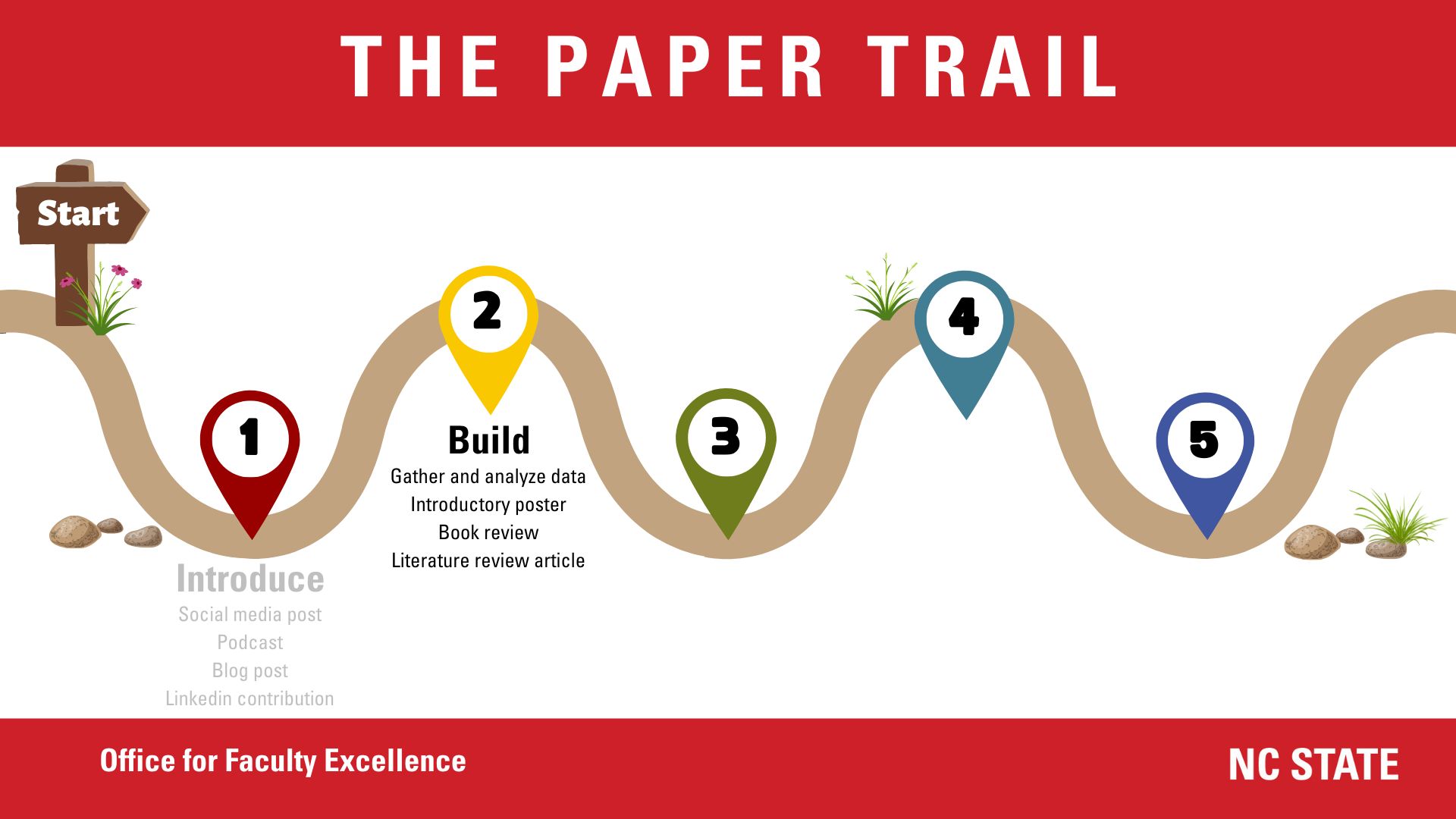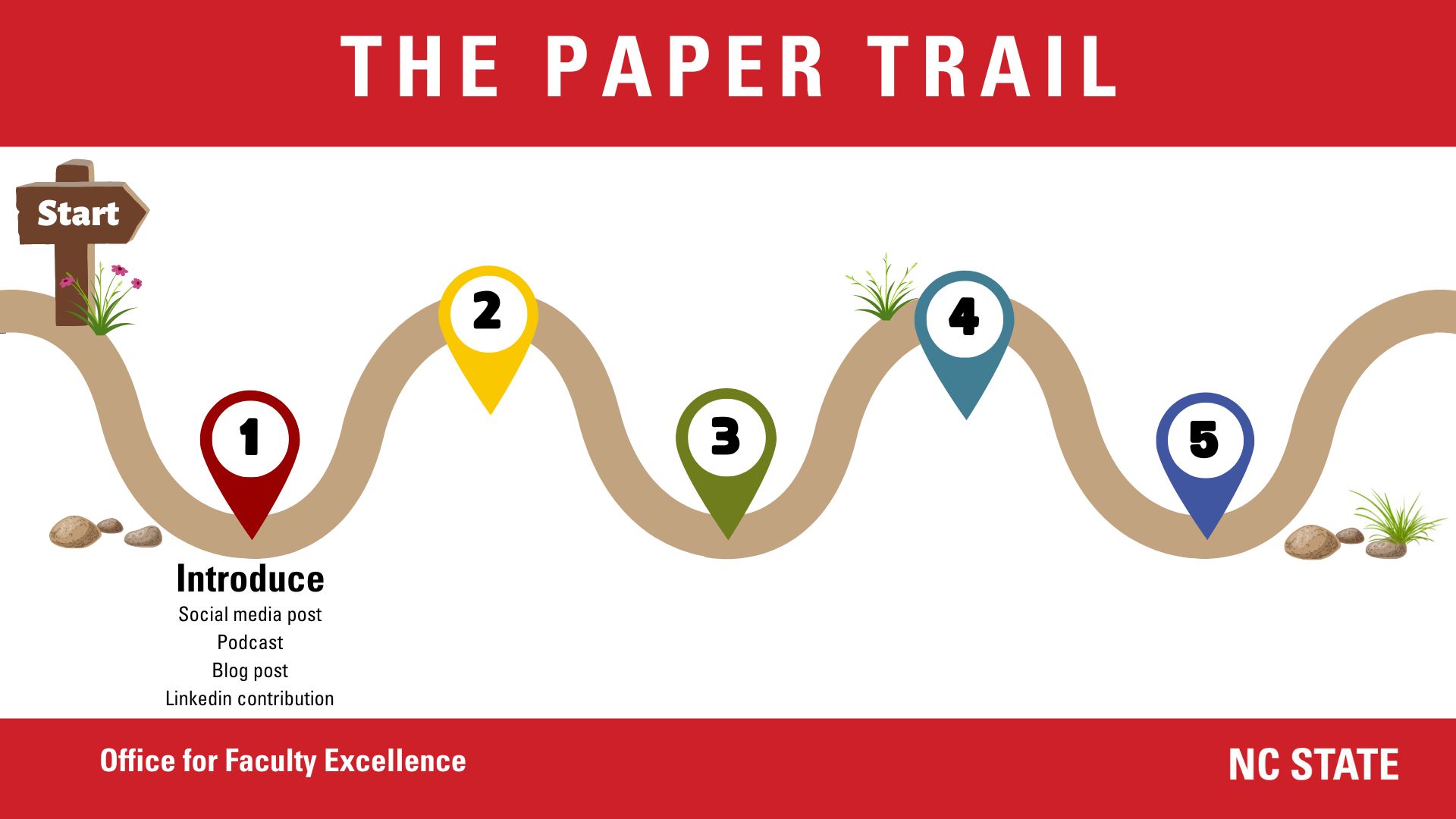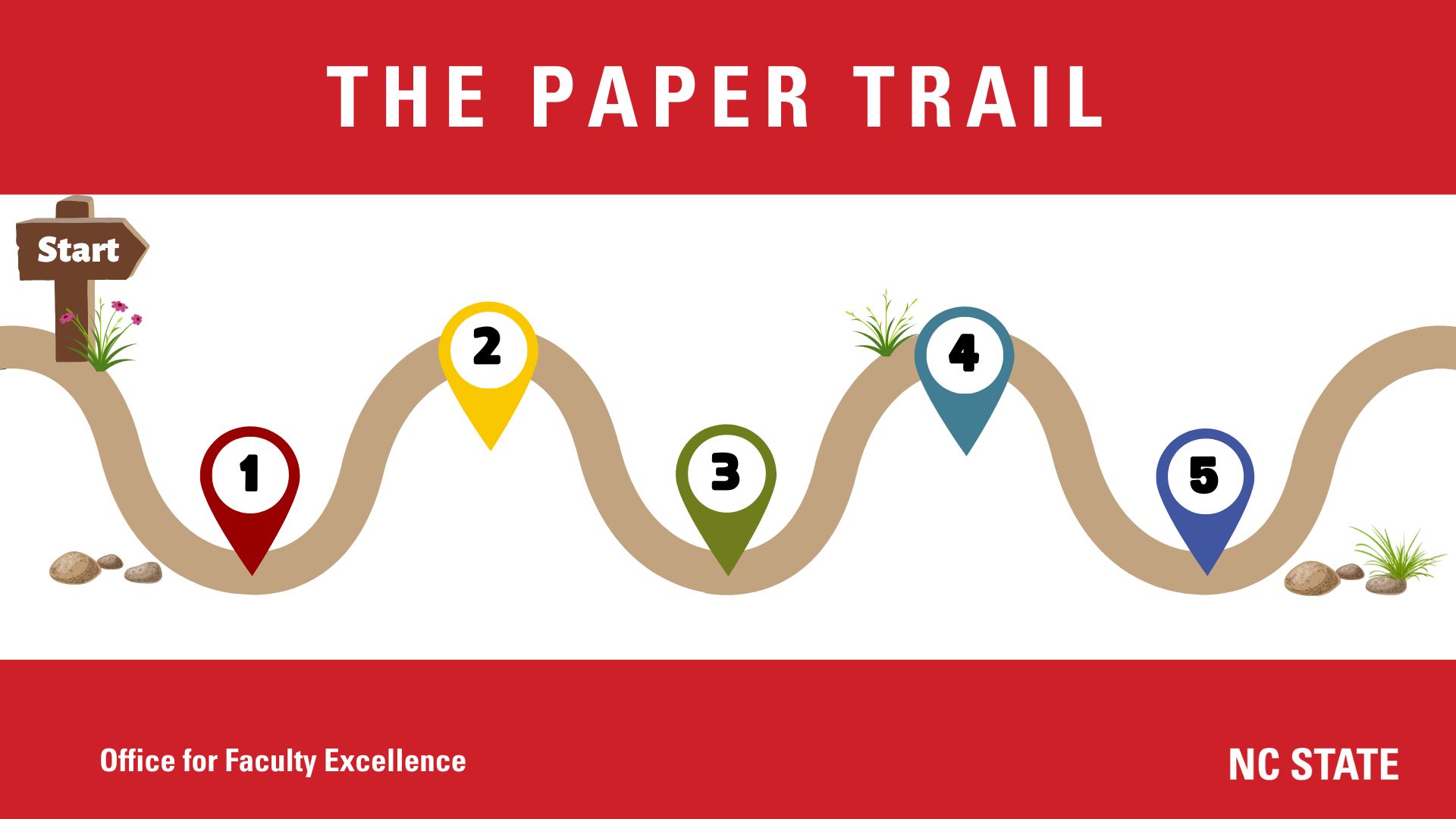OFE Newsletter: October 18, 2021
In this Issue:
- Upcoming Award and Fellowship Deadlines
- Back to Basics: Learning by Illustrating
- Designing Effective Online Courses
- Turn Your Hardship into Scholarship: Lessons from the COVID-19 Pandemic
- Upcoming Events for Faculty
Upcoming Award and Fellowship Deadlines
The following are select recognition opportunities with upcoming deadlines. Keep an eye out twice a month for new opportunities. Please direct any questions to the Director of External Faculty Awards and Recognition, Maria Almanza at maria_almanza@ncsu.edu
Smithsonian Fellowships
Smithsonian Fellowships are offered to individuals who design and develop proposals to conduct independent research. There are two types of fellowships offered by the Smithsonian:
- Central Fellowship Programs – These programs fund fellowships that take place at museums, research institutes and offices across the Smithsonian. Central Fellowships include: Biodiversity Genomics Postdoctoral Fellowship, Postdoctoral Fellowship in Conservation of Museum Collections, George Burch Fellowship in Theoretical Medicine & Affiliated Theoretical Science, and others.
- Museums, Research Institutes, Centers, and Office’s Fellowship Programs – These programs are managed by the Smithsonian unit. Fellowships include: A. Verville Fellowship at National Air & Space Museum, Charles A. Lindbergh Chair in Aerospace History, Lunder Fellowship at National Asian Art Museum, Arthur Molella Distinguished Fellowship at National Museum of American History, and others.
Eligibility Snapshot (see full eligibility requirements)
- Eligibility varies from program to program.
Deadline: varies according to program with deadlines as early as Nov. 1
Robert Wood Johnson Foundation- Health Policy Fellows Program
The RWJF Health Policy Fellows program provides the nation’s most comprehensive learning experience at the nexus of health, science, and policy in Washington, D.C. It is an outstanding opportunity for exceptional midcareer health professionals and behavioral/social scientists with an interest in health and health care policy. Fellows participate in the policy process at the federal level and use that leadership experience to improve health equity, health care, and health policy.
The fellowship requires a full-time commitment with a minimum 12-month residence in D.C., which prepares individuals to influence the future of health and health care in the nation. The fellowship begins in Sept. with an intensive three-and-a-half-month orientation arranged by the NAM, during which time the fellows meet with national leaders well-versed in health, health care policy, health equity, social determinants of health, and structural racism; think tanks and interest groups; key executive branch officials; and members of Congress and their staffs. Fellows also participate in seminars on health economics; the congressional budget process; current priority issues in federal health policy; and the process for federal decision-making. The concentrated orientation is designed to prepare the fellows for immediate success in federal legislative and executive branch positions.
The NAM will assist all fellows in setting up placement interviews. Each fellow is, however, solely responsible for selecting and securing his or her placement in a Federal govt office in Washington, D.C., no later than January 15, 2023. Fellowship placements generally begin no later than January 31.
Eligibility Snapshot (see full eligibility requirements)
- Exceptional mid career professionals
- Applicants must have earned an advanced degree in one of the following disciplines: medicine; nursing; public health; allied health professions; biomedical sciences; dentistry; economics or other social sciences; health services organization and administration; social and behavioral health; or health law
- Individual candidates for receipt of award funds must be U.S. citizens, or permanent residents at the time of application.
Deadline: Nov. 9, 2021 (3 P.M. EST) deadline for 3 reference letters; Nov. 12 (3 p.m. EST) deadline for preliminary application
Princeton University- Shelby Cullom Davis Center for Historical Studies Fellowship
Each year, six to eight scholars are selected out of a large pool of applicants to be in residence in Princeton as Visiting Davis Fellows, where they participate in the seminar and pursue research related to its theme. During the academic years 2022-24, the Shelby Cullom Davis Center for Historical Studies will focus on the topic of “Environment and Climate.” Fellowships at The Davis Center may run either for one semester (September-January or February-June) or for the full academic year, September-June.
Though the Center is normally able to offer fellowship support for only a single semester, it welcomes the residence of year-long Fellows who combine Center support with funds from elsewhere. Applicants are encouraged to apply for external funds or sabbatical support, and to apply for a year’s Fellowship if they have a reasonable expectation of bringing additional funds with them.
Eligibility Snapshot (see full eligibility requirements)
- Fellowships are awarded to scholars who hold full time academic positions, and who are expected to return to those positions at the conclusion of their Fellowship. Verification of employment and salary will be requested prior to approval by the Dean of the Faculty.
- A fellowship is awarded on the strength of the candidate’s research project, the relationship of that project to the Center’s theme, the candidate’s previous scholarly work, and the candidate’s ability to contribute to the intellectual life and intellectual exchange of the Center.
- Applicants who are non-U.S. nationals or who are members of traditionally underrepresented groups are encouraged to apply.
Dec. 1, 2021 at 11:59 p.m. EST
Burroughs Wellcome Fund, Climate Change and Human Health Seed Grants
The Burroughs Wellcome Fund aims to stimulate the growth of new connections between scholars working in largely disconnected fields who might together change the course of climate change’s impact on human health. Over the next two years, BWF will dedicate $1M to supporting small, early-stage grants of $2,500 – $50,000 toward achieving this goal.
Interest in:
- Linking basic/early biomedical science to climate-focused thinking
- Sustainability in health care systems, health care delivery outside institutions, and biomedical research
- Health impacts and health systems impacts of extreme weather events and other crises
- Outreach, communication, and education around climate and human health
Proposals will be accepted on a rolling basis from Sept 1, 2021- Aug 30, 2023. Review will be conducted quarterly. After each quarterly review, BWF will support, decline, or send proposals back to applicants for revision, but may hold some proposals over for future review. Recommended revisions may include suggestions that groups of applicants submitting similar proposals work together to develop a single proposal or that applicants consider becoming involved in efforts aligned with work funded in earlier quarters.
Eligibility Snapshot (see full eligibility requirements)
- an individual may only serve as a principal investigator/project director on one application during each review period.
- This call focuses on developing partnerships. Proposals from single institutions must develop partnerships that do not already occur naturally: for example, proposals from departments that draw students from the same shared graduate program are not responsive to this call.
- Individuals may only serve twice as directors (principal investigators/project directors) for proposals supported over time by this program. Awardees and past awardees from other BWF programs are eligible to apply.
Deadline: Dec. 15 by 4:00 p.m. EST
Ford Foundation Postdoctoral Fellowship
Awards will be made to individuals who have demonstrated superior academic achievement, are committed to a career in teaching and research at university level, show promise of future achievement as scholars and teachers, and are well prepared to use diversity as a resource for enriching the education of all students. The program will award approximately 24 postdoctoral fellowships. The fellowships provide one year of support for individuals engaged in postdoctoral study after the attainment of the Doctor of Philosophy (Ph.D.) or Doctor of Science (Sc.D.) degree. Applicants must present a clearly articulated plan of study or research that will further their career in higher education and should explain fully the particular benefits that would accrue from affiliation with the proposed host.
Fellowships are awarded for full-time research at appropriate nonprofit institutions of higher education or research, normally in the U.S., including universities, museums, libraries, govt. or national laboratories, privately sponsored nonprofits, govt. chartered nonprofit research organizations, and centers for advanced study. Each applicant should designate a faculty member or other scholar who will serve as the host mentor. The applicant is responsible for making all arrangements for affiliation with the proposed host institution prior to submitting application. Applicants are encouraged to choose a host other than the institution with which they are affiliated at the time of application.
Eligibility Snapshot (see full eligibility requirements)
- Must have completed all requirements for a Ph.D. or Sc.D. degree, including successful defense of the dissertation, no earlier than December 9, 2014 and no later than December 9, 2021.
- Each Fellow is expected to begin tenure on June 1 (for 12 months) or September 1 (for 9 or 12 months) of the year in which the award is received. Fellowships may not be deferred or delayed.
- A list of eligible fields of study is available here: Eligible Fields of Study List.
Deadline: Dec. 9 at 5:00 p.m. EST. Supplementary materials due Jan. 6 at 5:00 p.m. EST
Back to Basics: Learning by Illustrating
Our Fall Back to Basics series continues next week with Learning by Illustrating (Monday, October 25, 2021, 2:00-3:00 p.m. via Zoom): We will discuss the use of illustration tools as a means for students to learn the material while producing figures that can be used for class projects and beyond. Led by Dr. Maria Gallardo Williams, OFE SoTL Faculty Fellow, and Dr. Erin McKenney, Assistant Professor, Applied Ecology. A limited number of slots remain, so register today!
Designing Effective Online Courses
Designing Effective Online Courses (DEOC) is an online workshop to support faculty and staff across the UNC System in moving their courses to an online format or using digital tools in their physical classrooms.
We are pleased to announce another session starting next Monday, October 25, 2021. This will be the only time this is offered this semester.
Registration is now open. The workshop is free, but space is limited, and registration is required.
Who Should Attend:
This workshop will provide faculty and staff with information, tools, and experiences that will help them to be more successful—and more comfortable—teaching online or using digital tools in their physical classrooms.
Because time is of the essence, the UNC System Division of Academic Affairs, and its Digital Learning Office, have designed this workshop to focus on the most essential topics faculty members will need to make their courses more digital quickly and effectively. The material will be aimed at instructors who have minimal proficiency leading digital learning environments, but experienced instructors will also find new tips, hot topics, and useful activities.
When:
The next session of this workshop begins on October 25. Based on feedback from previous participants, there will be a two-week and a four-week pacing of the course. Participants can finish the work at their own pace, but they are encouraged to complete the course within the two- or four-week time frames in order to take advantage of the opportunity to collaborate with other faculty members.
What You’ll Experience:
- An interactive, hands-on, workshop approach
- A chance to create and build usable course assets throughout the workshop
- The opportunity to experience online teaching best practices from the student perspective
- A model of flexible course design that provides ample time for collaboration while also allowing participants to set their own pace
Visit the Digital Learning Initiative website to learn more and register.
Turn Your Hardship into Scholarship: Lessons from the COVID-19 Pandemic
Today on Faculty Forum, Dr. Maria Gallardo-Williams discusses the important of documenting what you learned about teaching during the pandemic:
I would like you to think about the changes that you made to adapt your course to remote online delivery, and consider sharing some of those changes with the larger education community. There is value in your journey of teaching in these times. Maybe you don’t think that others will learn from it, but there is a need to know what others have done, and our unique experiences need to be reflected in the Scholarship of Teaching and Learning literature.
Upcoming Events for Faculty
Tuesday, Oct. 19
Wednesday, Oct. 20
- Annotating: Zoom and Jamboard – 30 Minute Series, 12:30-1:00 p.m.
Thursday, Oct. 21
- Designing Your Moodle Course – Accessibility – 30 Minute Series, 12:30-1:00 p.m.
Monday, Oct. 25
- Mindful Mondays, 9:00-9:30 a.m.
- Back to Basics: Learning by Illustrating, 2:00-3:00 p.m.
- Categories:


